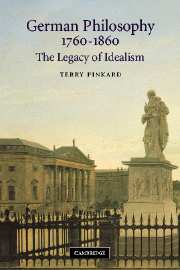Book contents
- Frontmatter
- Contents
- Acknowledgements
- List of abbreviations
- Introduction: “Germany” and German philosophy
- PART I KANT AND THE REVOLUTION IN PHILOSOPHY
- PART II THE REVOLUTION CONTINUED: POST-KANTIANS
- Introduction: idealism and the reality of the French Revolution
- 4 The 1780s: the immediate post-Kantian reaction: Jacobi and Reinhold
- 5 The 1790s: Fichte
- 6 The 1790s after Fichte: the Romantic appropriation of Kant (I): Hölderlin, Novalis, Schleiermacher, Schlegel
- 7 1795–1809: the Romantic appropriation of Kant (II): Schelling
- 8 1801–1807: the other post-Kantian: Jacob Friedrich Fries and non-Romantic sentimentalism
- PART III THE REVOLUTION COMPLETED? HEGEL
- PART IV THE REVOLUTION IN QUESTION
- Conclusion: the legacy of idealism
- Bibliography
- Index
8 - 1801–1807: the other post-Kantian: Jacob Friedrich Fries and non-Romantic sentimentalism
Published online by Cambridge University Press: 05 June 2012
- Frontmatter
- Contents
- Acknowledgements
- List of abbreviations
- Introduction: “Germany” and German philosophy
- PART I KANT AND THE REVOLUTION IN PHILOSOPHY
- PART II THE REVOLUTION CONTINUED: POST-KANTIANS
- Introduction: idealism and the reality of the French Revolution
- 4 The 1780s: the immediate post-Kantian reaction: Jacobi and Reinhold
- 5 The 1790s: Fichte
- 6 The 1790s after Fichte: the Romantic appropriation of Kant (I): Hölderlin, Novalis, Schleiermacher, Schlegel
- 7 1795–1809: the Romantic appropriation of Kant (II): Schelling
- 8 1801–1807: the other post-Kantian: Jacob Friedrich Fries and non-Romantic sentimentalism
- PART III THE REVOLUTION COMPLETED? HEGEL
- PART IV THE REVOLUTION IN QUESTION
- Conclusion: the legacy of idealism
- Bibliography
- Index
Summary
Although Romanticism dominated the development of immediate post-Kantian thought (after Reinhold), there were other, equally important interpretations afoot of where to take Kant. By the turn of the century (1800), Jacobi's influence, always large in this period, had already led to another, very different, appropriation of Kant in the person of Jacob Friedrich Fries (1773–1843). About the same age as the other post-Kantians at Jena (Schelling, Hegel, Schleiermacher, Novalis, and Hölderlin), Fries only managed to formulate his own views about a decade later than those working in the aftermath of the initial tumult surrounding Fichte and the early Romantics. Like many of them (for example, Niethammer, Hölderlin, Schelling, Hegel, and Schleiermacher), he too had first studied theology before moving to philosophy. Having been raised and educated in a famous Pietist community of the Herrnhut (Moravian) Brethren, he was sent to a Pietist boarding school in Niesky for his adolescent years. In 1795, he went to Leipzig to study philosophy, where he apparently came under the influence of Jacobi's work; in 1797, he studied for a year in Jena, leaving for while to be a private tutor, only to return to Jena at the end of 1800 (around the same time Hegel arrived in Jena). After 1805, he and Jacobi became friends, and Jacobi remained an admirer of Fries's work.
- Type
- Chapter
- Information
- German Philosophy 1760–1860The Legacy of Idealism, pp. 199 - 212Publisher: Cambridge University PressPrint publication year: 2002

